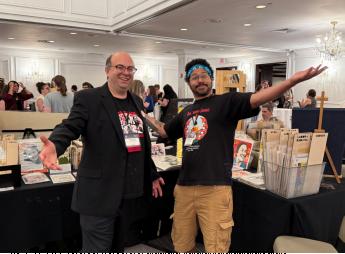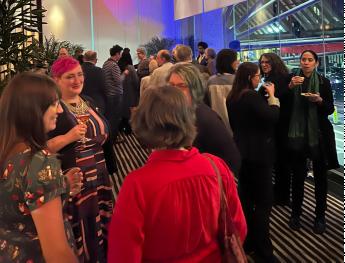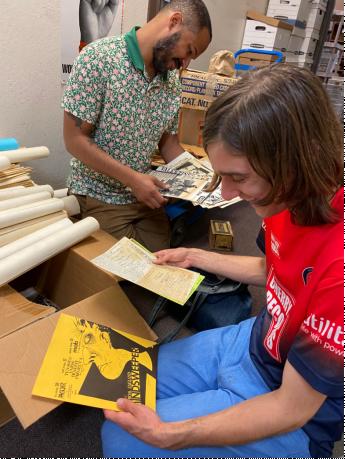Actualités Antiquarian Booksellers' Association of America Bolerium Books
Reflections on Diversity in the Rare Book Trade & Best Practice at the ABAA in the US

Image above: Alexander Akin and Matthew Jonassaint at the 2025 RBMS Booksellers' Showcase in New Haven, US
There are a host of reasons for being concerned about diversity in the antiquarian book trade. We want to remain relevant to new generations, and to foster a welcoming environment for collectors, booksellers, and institutional buyers of all backgrounds. Conditions vary widely between countries, and between regions in the same country, but let’s look at the community where I do business.
I live and work in a state, California, where only about 39% of the population is of European ancestry. A large percentage are immigrants, including my own wife, who is from China. And yet when we look at the history of the ABAA and its many hundreds of members through the years, less than one percent of our membership has been of anything but European ancestry. When young customers from diverse backgrounds walk into a book fair and see a lack of diversity among the dealers, they can sometimes wonder if they have stepped into a space where they are unwelcome. If you go to a comic book convention, or a sports event, or even a gem and mineral exposition, you’ll see all kinds of people, it’s clear that anyone belongs – but not always at our fairs. I have heard a number of people tell me privately about this feeling that they feel uncomfortable, and it breaks my heart. To me it is a sacred mission to ensure that our community is as open and welcoming as it can possibly be.
In recent years the ABAA has established two Initiatives designed to improve this situation: the Gender Equity Initiative (originally the Women’s Initiative) and the Diversity Initiative, which was established a bit later. The Gender Equity Initiative got its start from the recognition of a large gender imbalance in the membership of our organization. I ask people when they attend our fairs, “Based on the number of women working behind the counter, what percentage of our members would you guess are women?” The estimate is often 30-40 percent. However, despite the significant number of women who work at fairs, the actual membership of the ABAA is only about 18% women. The ABAA has always been open to women, beginning with our first foundational meeting in 1949, but the proportion has always been small.
The Gender Equity Initiative hosts an annual Networking Reception that coincides with the Boston International Antiquarian Book Fair. Held on Saturday evening after the fair’s doors close, the reception is designed to be an opportunity for women in the trade, and anyone who supports them, to meet one another, to informally share news, and, in general, to highlight the support that exists for those who wish to become a part of this antiquarian bookselling world. Not only exhibiting dealers, but anyone in attendance is welcome to join. We have made it a priority to invite non-ABAA booksellers who have shown potential interest in our Association.

The other main activity undertaken by the Gender Equity Initiative, and a very important one, is the ABAA Mentorship Program. This program is open to all early-career participants in the rare book trade. It pairs applicants with experienced members of the ABAA, who can offer advice or answer questions about running this sort of business. This year we had our largest group of applicants yet, 18, about evenly divided between men and women. Many former mentees have gone on to become ABAA members themselves.
Moving now to the Diversity Initiative, one of its earlier projects was to develop Description & Display Recommendations intended to help our members grapple with sensitive material, in other words, items that may be seen today as racist, sexist, or insensitive. This document can be found here: https://www.abaa.org/about-antiquarian-books/description.
Another program that the Diversity Initiative has undertaken with the very generous financial support of AbeBooks is a paid summer internship. Those who are seriously interested in learning about the trade, but may perhaps feel that people from their community are not represented in our ranks, can apply for a ten-week, hands-on experience working at an ABAA business, learning about every aspect of our work, from acquisition of stock to cataloging it, selling, and packing it for shipment. For this program, we seek applications from both sides – those who apply to become interns, and those in the ABAA who wish to host them. The selected intern is matched with a host whose specialty best aligns with his or her interests.
To give some idea of the financial support that is given by AbeBooks, the intern is paid $25 an hour for a 40-hour work week, and the program lasts ten weeks. One intern is funded by this program each year. The intern is asked to make recordings about their experience in several video updates about their work, which are shared on social media by AbeBooks. For those ILAB affiliates in other countries who might be interested in pursuing a similar program, the main areas of focus are securing a funding source to pay the intern, finding members who understand and support the goals of the internship and are prepared to devote the time to hosting and training the intern, and a broad network to aid in getting the word out to prospective applicants. Each year, the number of qualified applicants has increased, but it took a couple of years to grow awareness and our network to publicize the internships.
The U.S. is also geographically very large, which would be less of a concern for many ILAB affiliates. The ABAA makes an effort to place interns in cities where the intern would like to live and work for the term of the internship. This can create complications in an expensive housing market, or in places that are not well-served by public transportation.
The U.S. has strict labor laws that govern internships. We made sure to seek legal counsel and to communicate to prospective hosts that the interns are there to learn, not just to engage in menial tasks. I would encourage anyone seeking to create such a program to make sure they understand the labor laws, and to set clear expectations for both the intern AND the host. I’m glad to offer further insight if anyone has questions. I’ll tell you a little bit about my own experience hosting an intern.
Last year, my shop, Bolerium Books, had the honor of hosting Matthew Jonassaint as our intern through the ABAA’s program. He had some experience working at a small shop in Utah, and knew some ABAA members, especially after having attended CABS-Minnesota. Being of Haitian and Puerto Rican background, and gay, he was particularly interested in Bolerium’s specialties of gay literature and immigrant activism. Once he arrived at Bolerium, however, it turned out that he had many areas of expertise beyond these. In this photo, he and another member of our crew are looking at an archive of punk rock posters from the 1970s, an area where he turned out to know more than anyone in the shop.

Matthew also turned out to have a lot of technical skills that older staff like myself find troublesome - For example, he helped to film and edit a video for the ABAA’s 75th anniversary last summer. In short, it became clear that he was indispensable, and after his internship period had ended, Bolerium hired him as a member of our full-time staff. As a young, enthusiastic spokesman for the shop, it’s great to be able to bring him to events like the RBMS Bookseller Showcase.
The Diversity Initiative has also started a shorter, more intense guided program for individuals seeking to pursue a career in the antiquarian and rare book trade. Two applicants are selected for a one-week program the week before the Boston fair, which includes visits to shops, opportunities to meet with librarians, meals with major figures from the trade as well as private collectors, and of course, lots of time at the book fair afterwards. It went very well last year, and in fact I met one of the participants again at the New York fair, so her interest is clearly serious. This autumn we plan to run this program again.
Another thing we have done to help increase the proportion of younger and diverse attendees at our book fairs is to make special arrangements to attract university students. These are not deep-pocketed, wealthy customers, usually, but everyone has to start somewhere. And the general atmosphere of the fair is made more energetic by their presence. Because the younger generations in the United States are more diverse, simply by bringing in more young people, we create a more welcoming environment in this regard as well.
To conclude, I believe that the future health of the trade, and the continuing cultural relevance of the antiquarian book trade, require attention to these issues. I look forward to hearing the thoughts of colleagues from around the world about the situation in their own countries. Please feel free to contact me at president@abaa.org.
Text and images: Alexander Akin
